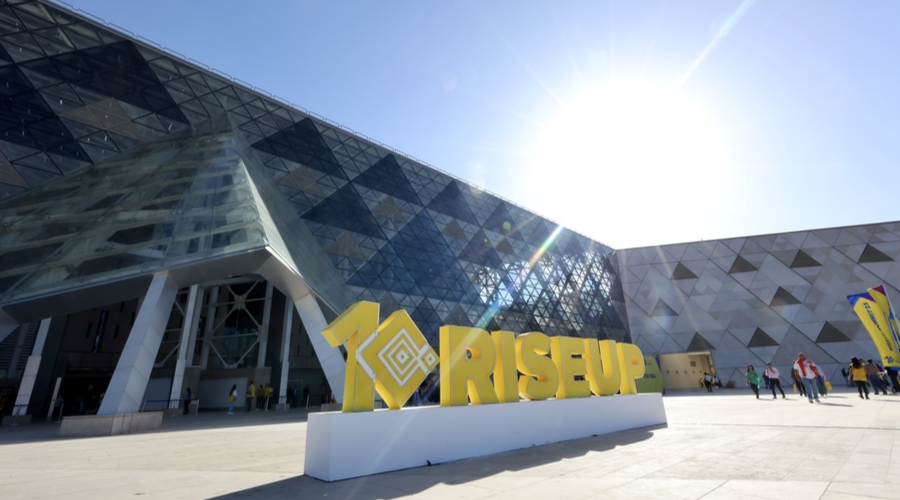Egypt's economic crisis in focus at RiseUp's 10th summit

For the past decade, RiseUp has been one of the most influential startup events in Egypt and the wider Middle East and North Africa region. The annual event plays a proactive role in orienting youth towards entrepreneurship, connecting startups to prospective investors, mentorship and other resources to help them see their companies through.
Against the backdrop of today’s turbulent macroeconomic outlook, this year’s summit, held under the banner of “Stay Real”, emphasised caution, with the majority of talks highlighting the various challenges faced by startups in Egypt and the rest of Africa amid an increasingly tight fundraising landscape and a high-inflation environment.
The Egyptian dilemma
As of late, the Egyptian startup ecosystem has been reeling under the economic fallout of the devaluation of the local currency, which, coupled with the ongoing import restrictions and a shortage of foreign currency has made it difficult for startups to operate effectively. As a result, a lot of startups have recently relocated to other countries where there is a more stable financial environment so as to attract venture capital investment.
"The past two years have made it really hard for founders to expect what lies ahead. There is a lot of ambiguity in terms of the economic situation and if we are able to bring clarity to founders that will help increase the inflow of funding into the country. For now, Egypt is the best place to start their business; because if you make mistakes, it won't cost you that much," said Hadeer Shalaby, managing director of talabat Egypt during a panel discussion named "Unleashing the potential of startups in Egypt: bridging the gap between government efforts and startup policy needs".
Shalaby also highlighted the need to incentivise startup founders and global counterparts to operate in Egypt through cash and non-cash offerings.
In the same vein, Mohamed Ehab, founder of advisory firm Entlaq, spoke about how the lack of clarity of the macroeconomic situation in the country has affected the fundraising prospects for startups. "In simple math, if there's a company whose valuation is worth EGP 1 billion and has been registering a certain growth rate, after the devaluation, this progress is like it never happened," he said, calling for the establishment of more governmental funds to plug this financing gap.
Despite these challenges, Egypt remains one of the largest markets in terms of the number of deals and value of funding pumped into its startups. In fact, Egypt is the second-largest recipient of deals across Africa, and the third-largest recipient of the amount of funding across Mena. This growth is likely to continue albeit at a muted pace.
During a panel on the future of investments in Mena, Anissa Kanoun, MENAP's regional lead for venture capital at the International Finance Corporation (IFC), argued that the current challenging environment will eventually spawn more resilient business models.
"We have to remember that the Egyptian ecosystem went through a currency devaluation not too long ago, and then it managed to come out resilient and to produce some incredible startups. I think Egypt is unique to Mena because it has a lot more mature founders," she said.
"In every emerging market…the VC ecosystem also starts with copycat models from different markets; we're seeing original innovation in Egypt. And part of it is that the business models that are solving real problems here can be taken and applied to other emerging markets like Pakistan and Bangladesh," Kanoun added.
Fintech
On the startup front, fintechs in the country are scrambling to attend to the ever-changing consumer behaviour in light of the crisis, working to provide an added value to the increasingly cost-conscious consumer and help them future-proof their wealth.
During a panel discussion on "promoting financial literacy", Ahmed Hammouda, CTO and co-founder of investment platform Thndr, claimed that inflation acts as "the Black Friday" of the investment landscape.
"There is an actual opportunity; because there are companies listed on the Egyptian stock market that are expected to perform better during inflation in terms of defensive necessities," he said. "Now more than ever, one needs to be ready for a rainy day to protect the value of their money from inflation by not keeping it under the rug, but rather through investing."
On the same note, Ahmed Wadi, founder of Money Fellows, an app digitising the rotating savings and credit association (Rosca) model, explained that the startup is increasingly looking to incorporate personal savings into its product offering as a means to expand its user base.
"We have visibility on the income level of our consumers. So we don't try to maximise the credit component only because it's revenue-generating, but we also try to put as a slight saving component in that every single user gets recommended not only to join a borrowing slot and borrow money only, but also continuously save money, which generates a yield, which should make sense in the long term for them," Radi added.
The three-day event, which took place over the weekend at the Grand Egyptian Museum (GEM), is believed to have attracted 20,000 attendees from 60 countries across the globe. As ever, the summit featured a large number of sessions and workshops playing along the trio of its classic themes: technology, creativity and capital.


